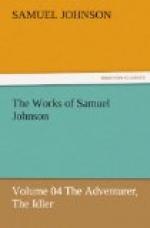Aurum per medios ire satellites,
Et perrumpere amat saxa, potentius
Ictu fulmineo. Concidit
auguris
Argivi domus ob
lucrum
Demersa exitio. Diffidit urbium
Portas vir Macedo, et subruit aemulos
Regis muneribus:
Munera navium
Saevos illaqueant
duces. HOR. Lib. iii.
Ode xvi. 9.
Stronger than thunder’s winged force, All-powerful gold can spread its course, Thro’ watchful guards its passage make, And loves thro’ solid walls to break: From gold the overwhelming woes That crush’d the Grecian augur rose: Philip with gold thro’ cities broke, And rival monarchs felt his yoke; Captains of ships to gold are slaves, Tho’ fierce as their own winds and waves. FRANCIS.
The close of this passage, by which every reader is now disappointed and offended, was probably the delight of the Roman Court: it cannot be imagined, that Horace, after having given to gold the force of thunder, and told of its power to storm cities and to conquer kings, would have concluded his account of its efficacy with its influence over naval commanders, had he not alluded to some fact then current in the mouths of men, and therefore more interesting for a time than the conquests of Philip. Of the like kind may be reckoned another stanza in the same book:
—Jussa coram non sine conscio
Surgit marito, seu vocat institor,
Seu navis Hispanae
magister,
Dedecorum pretiosus
emptor. HOR. Lib. iii.
Ode. vi. 29.
The conscious husband bids her rise, When some rich factor courts her charms, Who calls the wanton to his arms, And, prodigal of wealth and fame, Profusely buys the costly shame. FRANCIS.
He has little knowledge of Horace who imagines that the factor, or the Spanish merchant, are mentioned by chance: there was undoubtedly some popular story of an intrigue, which those names recalled to the memory of his reader.
The flame of his genius in other parts, though somewhat dimmed by time, is not totally eclipsed; his address and judgment yet appear, though much of the spirit and vigour of his sentiment is lost: this has happened in the twentieth Ode of the first book:
Vile potabis modicis Sabinum
Cantharis, Graeca quod ego ipse testa
Conditum levi, datus in theatro
Cum tibi plausus,
Care Maecenas eques: ut paterni
Fluminis ripae, simul et jocosa
Redderet laudes tibi Vaticani
Montis imago.
A poet’s beverage humbly cheap,
(Should great Maecenas be
my guest,)
The vintage of the Sabine grape,
But yet in sober cups shall
crown the feast:
’Twas rack’d into a Grecian
cask,
Its rougher juice to melt
away;
I seal’d it too—a pleasing
task!
With annual joy to mark the
glorious day,
When in applausive shouts thy name
Spread from the theatre around,
Floating on thy own Tiber’s stream,
And Echo, playful nymph, return’d
the sound. FRANCIS.




